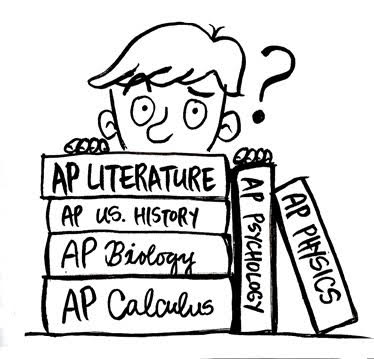
When considering AP courses, it’s necessary to weigh the positives and negatives before coming to a final decision. Taking into account upcoming life decisions, such as what college to go to, and career options can also help students decide what works best for them.
The workload and content in AP courses tends to be more difficult than in a regular class. Homework, assigned reading, and writing are common in AP classes and are often given at more frequent rates compared to on-level classes. Social Studies department chair Rena Long, who teaches both AP and on-level, sees a difference in the work and has even had to learn things herself.
“The content is a little bit more rigorous in an AP class, a lot more rigorous than it is in regular, and AP classes are considered college-level. The reading is difficult in the analysis and the thinking part of it is more deep,” Long said. “I’ve had to teach myself a lot about the writing process and go to a lot of extra stuff to learn how to teach my students to write. The content is very deep, so there’s no way that a teacher could know all of the content.”
The amount of work requires students to learn how to self-study and manage their time, and the test at the end of the year means students need to truly understand the content. Even taking one AP class can make it essential to know how to properly manage time. Junior Christopher Do is taking multiple AP classes and has had to adjust to the busy schedule.
“I’m taking five AP classes right now, but I’m taking seven exams. They’re classes I was interested in taking, I just didn’t have space. I went ahead and studied most of my math and sciences. Those aren’t too intensive, but they’re pretty difficult. For APUSH [AP US History] and Lang [AP English], I have a fair amount of work like notes and whatnot. Lang, I think it’s lesser, it’s just more rigorous,” Do said.
Even though students inevitably have to do some preparation themselves, teachers are also working to prepare them. Their effort is put towards helping ensure their students are ready for advanced courses. Advanced English II teacher Beth Simmonds understands the importance of prepping her students for college-level courses.
“The classes that prepare you for AP, at least in English, are Advanced English I and Advanced English II. It’s a little difficult because these are also state-tested levels, so it becomes a balancing act. It used to be more straightforward, and we just taught to the level of college writing. Now we almost have to split star readiness and AP level, so it takes some finesse to do it,” Simmonds said. “I think Lake Ridge does a great job of doing that by working in teams. The English I and English II teams discuss quite a bit.”
One of the biggest aspects of choosing whether to take AP is what students have planned for college. Most students leaning towards out-of-state schools gravitate to the type of college credit AP offers. Sophomore Hawin Amini has planned to take AP classes because of her future goals.
“I’m taking two APs this year, and I’m planning to take five next year. Experiencing what it’s like to take really advanced classes like that, and the opportunity to earn college credits, is great. I plan on going out-of-state and I know it’s more risky. If you take TCC and want to go out of state, they usually don’t accept it so I thought AP was better,” Amini said.
While AP classes have clear benefits such as college credit and a GPA boost, there can also be some negatives if a student is unprepared. Acknowledging these negatives is important when deciding whether to take AP or not. Academic Associates Principal Shira Fuller understands both the pros and cons of AP.
“There’s the most obvious benefit of just having AP on your transcript. If you get a three or higher on the exams, you can submit that to most colleges for college credit. I took AP classes, and it exposed me to having to be more independent and having to work with more complex concepts,” Fuller said. “It’s a lot of extra work, we truly do differentiate between on-level and AP here. I’ve had a number of transfers that came from other schools where it wasn’t being taught as rigorously. It’s already more complex, and it builds off of that complexity. We always tell students ‘Make sure you really, really know.’ We’re always cautious, we want you to think about it.”
The decision to take AP classes requires students to consider multiple different aspects of their future. From where they’re going to college to their career goals, students have a lot to consider when planning their courses and whether AP is worthwhile.

